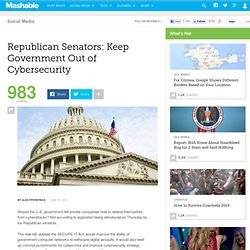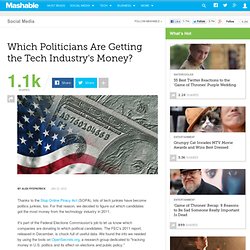

Republican Senators: Keep Government Out of Companies' Cybersecurity. Should the U.S. government tell private companies how to defend themselves from cyberattacks?

Not according to legislation being introduced on Thursday by six Republican senators. The new bill, dubbed the SECURE IT Act, would improve the ability of government computer networks to withstand digital assaults. It would also beef up criminal punishments for cybercrime and improve cybersecurity strategy sharing between the government and business worlds. Its sponsors include Republican Sens. John McCain (Ariz.), Kay Bailey Hutchison (Texas), Chuck Grassley (Iowa), Saxby Chambliss (Ga.), Lisa Murkowski (Alaska) and Dan Coats (Ind.). The bill would not, however, require the Department of Homeland Security (DHS) to enforce cybersecurity standards for private businesses that run systems considered essential to national security.
Sens. However, those very companies have argued that they know best how to keep their systems safe and secure without the government being involved. Integrity - theory, guardians. Typosquatting Sites ‘Wikapedia’ and ‘Twtter’ Have Been Shut Down. Two fake websites posing as Wikipedia and Twitter have been kicked off the Internet and fined £100,000 ($156,000) each.

The companies behind typosquatting websites capitalize on typos — they register domain names that are similar to highly trafficked website names, and are usually missing a letter or have common misspellings of popular sites. Typosquatting websites such as ‘Wikapedia’ and ‘Twtter’ are popping up on the web to trick unsuspecting web users into clicking on fake ads that claim the user has won a prize. In the case of these two sites, to receive a prize, like an iPad, people were asked for their cellphone number.
The site sent a text with a pin and more texts with survey questions. Each time a person responded to the survey questions via texts he or she was charged £1.50. PhonepayPlus, the UK watchdog body responsible for regulating premium rate telephone services that booted ‘Wikapedia’ and ‘Twtter’ from the web, wrote in a statement: Politics and Tech.
Power in Numbers - China Aims for High-Tech Primacy. Tyler Cowen vs. Erik Brynjolfsson: Can Technology Be Society's Economic Engine? (Video) Which Politicians Are Getting the Tech Industry's Money? Thanks to the Stop Online Piracy Act (SOPA), lots of tech junkies have become politics junkies, too.

For that reason, we decided to figure out which candidates got the most money from the technology industry in 2011. It's part of the Federal Elections Commission's job to let us know which companies are donating to which political candidates. The FEC's 2011 report, released in December, is chock-full of useful data. We found the info we needed by using the tools on OpenSecrets.org, a research group dedicated to "tracking money in U.S. politics and its effect on elections and public policy. " Note that companies don't give money directly to campaigns. As it turns out, only three of the presidential hopefuls in 2012 have received a substantial proportion of their total largesse from the tech industry, labeled "Computers/Internet" on OpenSecrets: Ron Paul (with $166,764), Mitt Romney ($392,400) and Barack Obama ($1,338,109).
Which tech giant is the biggest contributor to political campaigns? SOPA. Here we go again: Congress considers blocking government's open access policy.